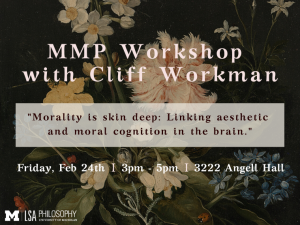Presented By: Department of Philosophy
MMP Speaker Event - Morality is skin deep: Linking aesthetic and moral cognition in the brain.
Cliff Workman (University of Pennsylvania)

Title: Morality is skin deep: Linking aesthetic and moral cognition in the brain.
Abstract: Facial beauty is linked to a “beauty-is-good” stereotype, whereby people expect positive character traits in people with attractive faces. We find evidence for a complementary “anomalous-is-bad” stereotype, which facilitates negative biases against people with visible facial differences like scars and palsies. This evidence is found at multiple levels of organization: At the level of the brain, people show a specific neural response to anomalous faces in the amygdala. At the level of attitudes, people make negative character evaluations about individuals with facial anomalies, are explicitly biased against them as a group, and misjudge their expressions of facial affect to be more negative than they actually are. These negative attitudinal biases are detectable regardless of the kind of facial anomaly. At the level of behavior, less prosociality is detected towards individuals with visible facial differences compared to typical faces in people with the most to give. Across levels of organization, the specific amygdala response to facial anomalies is associated with stronger just-world beliefs (i.e., people get what they deserve), less trait empathic concern, and less prosociality elicited by anomalous faces. Data collected from the Hadza hunter-gatherers in Tanzania suggests the anomalous-is-bad stereotype is learned, rather than emerging from an adaptive aversion to pathogen threat. In a recent study, we tested the hypothesis that implicit biases towards people with visible facial differences can be unlearned through routine exposure to faces bearing such anomalous features. Participants’ implicit biases were measured before and after they completed an exposure intervention, which was delivered remotely using a custom mobile phone application. Our findings suggest that exposure to people with facial anomalies, especially exposure that elicits perspective taking, can reduce negative biases towards them in a targeted fashion.
Abstract: Facial beauty is linked to a “beauty-is-good” stereotype, whereby people expect positive character traits in people with attractive faces. We find evidence for a complementary “anomalous-is-bad” stereotype, which facilitates negative biases against people with visible facial differences like scars and palsies. This evidence is found at multiple levels of organization: At the level of the brain, people show a specific neural response to anomalous faces in the amygdala. At the level of attitudes, people make negative character evaluations about individuals with facial anomalies, are explicitly biased against them as a group, and misjudge their expressions of facial affect to be more negative than they actually are. These negative attitudinal biases are detectable regardless of the kind of facial anomaly. At the level of behavior, less prosociality is detected towards individuals with visible facial differences compared to typical faces in people with the most to give. Across levels of organization, the specific amygdala response to facial anomalies is associated with stronger just-world beliefs (i.e., people get what they deserve), less trait empathic concern, and less prosociality elicited by anomalous faces. Data collected from the Hadza hunter-gatherers in Tanzania suggests the anomalous-is-bad stereotype is learned, rather than emerging from an adaptive aversion to pathogen threat. In a recent study, we tested the hypothesis that implicit biases towards people with visible facial differences can be unlearned through routine exposure to faces bearing such anomalous features. Participants’ implicit biases were measured before and after they completed an exposure intervention, which was delivered remotely using a custom mobile phone application. Our findings suggest that exposure to people with facial anomalies, especially exposure that elicits perspective taking, can reduce negative biases towards them in a targeted fashion.